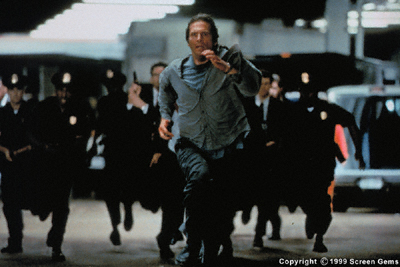Arlington Road
 Is it possible for a thriller — any thriller — to surprise us any more? We go to these things, after all, expecting a certain number of generic twists and turns; there is some comfort (and more than a little boredom) in our knowledge that a thriller will play by the rules, follow the accepted mainstream template. Increasingly, one has to look outside the studio system. Arlington Road got a nationwide opening and has big-name stars, but notice its distributor: Sony Screen Gems. In other words, this is something of an indie thriller in big-studio sheep’s clothing. The movie is both darker and more intimate than you expect.
Is it possible for a thriller — any thriller — to surprise us any more? We go to these things, after all, expecting a certain number of generic twists and turns; there is some comfort (and more than a little boredom) in our knowledge that a thriller will play by the rules, follow the accepted mainstream template. Increasingly, one has to look outside the studio system. Arlington Road got a nationwide opening and has big-name stars, but notice its distributor: Sony Screen Gems. In other words, this is something of an indie thriller in big-studio sheep’s clothing. The movie is both darker and more intimate than you expect.
Arlington Road grabs you from its stressful pre-credits scene, in which history professor Michael Faraday (Jeff Bridges), driving along one afternoon, happens across a boy limping in the middle of the road, dazed and bleeding. The boy, it turns out, had been messing around with a homemade bomb and nearly blew his hand off. Michael scoops the boy up and rushes him to the hospital; he eventually discovers that the kid is one of three children in the happy family of Oliver and Cheryl Lang (Tim Robbins and Joan Cusack), who live just across the street from Michael and his own little boy. Michael anguishes over the idea that he didn’t know the name of his neighbors’ son, but we sense that Oliver and Cheryl have been unknown to Michael up to this point because they wanted to be unknown.
As it happens, Michael is carrying more than the usual amount of modern American paranoia. His wife, an FBI agent, was killed in a senseless exchange of fire at a remote West Virginia shack; he immerses himself in his courses, where he teaches the history of terrorism and is prone to impassioned rants about the government and their official lies. Jeff Bridges, who could sell snow to Eskimos, lets us see Michael not as a conspiracy nut but as a grieving widower trying to make sense of a world where children are blown to bits in day-care centers. And he’s starting to suspect good-buddy neighbor Oliver of plotting to blow up a building.
Sharply directed by Mark Pellington, and written by Ehren Kruger with an ear for banal suburban banter hiding sinister truths, Arlington Road lulls us for a while into thinking it’s about the misplaced mistrust of our era. Tim Robbins and Joan Cusack (whose character could have been fleshed out more) don’t make the mistake of playing Oliver and Cheryl as “Hi honey, I’m home” cartoons. They are legitimately likable people, and we want to believe Oliver when, feeling hurt and insulted, he confronts Michael about the snooping he’s been doing. We begin to wonder if Michael is merely a good man deranged by loss and obsessed with the spectre of terrorism in every house, at every backyard barbecue.
But the movie has a few curves in store for us, leading to a regrettable car chase that’s a little too drawn out. Yet even the car chase, as I look back on it, has come to seem fairly subversive. A car chase is usually the appetizer before the main course, the standard climax in which the hero confronts the villain and blows him away. As Michael points out to his class, we need a narrative — both in movies and in our daily news — in which only one loner is responsible for an atrocity, and once he dies, his evil dies with him. Let’s just say Arlington Road isn’t that narrative. With its big-name stars and its fender-crunching pre-climax, the movie lulls you into a false sense of security; just when you think you’ve grasped it, it blows up in your hand.
Explore posts in the same categories: thriller, underrated
Leave a comment